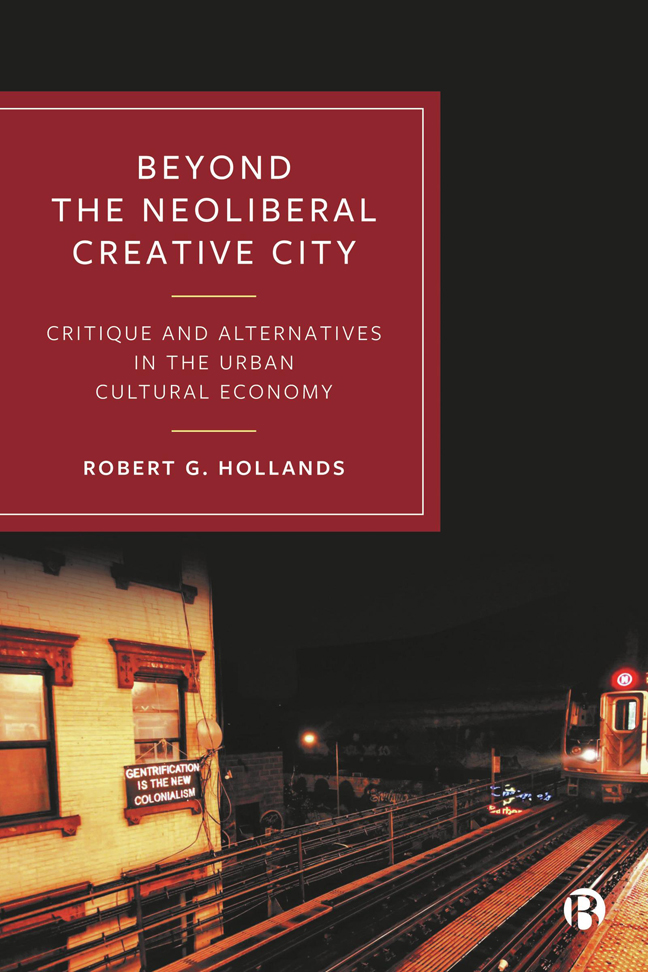Book contents
- Frontmatter
- Dedication
- Contents
- List of Figures, Tables and Case Studies
- About the Author
- Preface
- 1 Neoliberalism, Creativity and Cities
- 2 Urban Entrepreneurialism: The Emergence of the Cultural Economy
- 3 Critiquing the Neoliberal Creative City: But Long Live Alternative Creative Spaces!
- 4 Urban Cultural Movements and Anti-Creative Struggles
- 5 Neoliberal Nightlife and its Alternatives
- 6 Rethinking the Tourist City: Contestation and Alternative Cultural Tourism
- 7 Creative Polarization, Division and Exclusion
- 8 Beyond the Neoliberal Creative City
- Notes
- References
- Index
4 - Urban Cultural Movements and Anti-Creative Struggles
Published online by Cambridge University Press: 25 January 2024
- Frontmatter
- Dedication
- Contents
- List of Figures, Tables and Case Studies
- About the Author
- Preface
- 1 Neoliberalism, Creativity and Cities
- 2 Urban Entrepreneurialism: The Emergence of the Cultural Economy
- 3 Critiquing the Neoliberal Creative City: But Long Live Alternative Creative Spaces!
- 4 Urban Cultural Movements and Anti-Creative Struggles
- 5 Neoliberal Nightlife and its Alternatives
- 6 Rethinking the Tourist City: Contestation and Alternative Cultural Tourism
- 7 Creative Polarization, Division and Exclusion
- 8 Beyond the Neoliberal Creative City
- Notes
- References
- Index
Summary
Within the last decade or so, there has been a global resurgence of artistled struggles around neoliberal urban space (Serafini et al, 2018). While organized anti-creative city movements have tended to be more prominent in Europe (NiON, 2010; Kirchberg and Kagan, 2013; Novy and Colomb, 2013; d’Ovidio and Rodríguez Morató, 2017; Romeiro, 2017; Sanchez Belando, 2017, among others), resistance also exists in countries like the US (Grodach, 2017), Canada (McLean, 2014b; King, 2016), Australia (Shaw, 2014) and in cities of the Global South (Luger, 2019; De Beukelaer, 2021; Martin-Iverson, 2021).
For example, 2011–2012 saw the growth of a range of cultural occupations across Italy, including the creation of an imaginary ‘People's Center for Art’ in a 31-storey skyscraper in Milan by a movement known as MACAO (d’Ovidio and Cossu, 2017). Their focus on guerrilla branding tactics and self-organized cultural production has resulted in a broader cultural experiment in creative democracy in the city (Valli, 2015). Luger's (2019: 330) research on Singapore also reveals how the current ‘arts generation’ is ‘striking back, against the state, in the form of critical expression’ despite facing creative incorporation and ‘authoritarian boundaries’. In 2016, the Infringement movement staged their own alternative gathering in Montreal in protest against the World Fringe Congress's increasingly corporate approach to fringe (Montreal Infringement Festival, 2016) (see Figure 4.1). Meanwhile, in Berlin in 2012, Haben und Brauchen (‘to have and to need’), a movement of alternative cultural workers, challenged conventional arts policy in the city by producing a powerful manifesto (Haben und Brauchen, 2012).
These varied examples feed into the notion of opposition towards the dominant neoliberal creative city paradigm and represent what I, and others, refer to as ‘urban cultural movements’ (Novy and Colomb, 2013; Valli, 2015; Hollands, 2019). I define these as movements that have creativity or culture at the core of their principles, activity and struggle against the neoliberal city. This chapter builds upon critiques of Florida's creative city paradigm and the discussion of the potential of alternative creative spaces developed in Chapter 3. It is concerned to explore how activist artists and groups can work collectively and liaise with other urban social movements to envisage an alternative urban future.
- Type
- Chapter
- Information
- Beyond the Neoliberal Creative CityCritique and Alternatives in the Urban Cultural Economy, pp. 70 - 90Publisher: Bristol University PressPrint publication year: 2023



